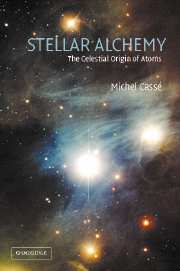Book contents
- Frontmatter
- Contents
- Preface
- Acknowledgements
- 1 Nuclear astrophysics: defence and illustration
- 2 Light from atoms, light from the sky
- 3 Visions
- 4 Contents of the sky: atomic sources and fountains
- 5 Nuclear suns
- 6 Sociology of stars and clouds
- 7 Histories
- 8 Ancient stars in the galactic halo
- 9 Conclusion
- Appendix 1 Invisible matter and energy
- Appendix 2 Supernovas and cosmology
- Appendix 3 Explosions
- Appendix 4 Stellar nucleosynthesis
- Appendix 5 Galactic evolution
- Appendix 6 Key dates
- Appendix 7 Constants and units
- Appendix 8 Websites
- Bibliography
- Index
9 - Conclusion
- Frontmatter
- Contents
- Preface
- Acknowledgements
- 1 Nuclear astrophysics: defence and illustration
- 2 Light from atoms, light from the sky
- 3 Visions
- 4 Contents of the sky: atomic sources and fountains
- 5 Nuclear suns
- 6 Sociology of stars and clouds
- 7 Histories
- 8 Ancient stars in the galactic halo
- 9 Conclusion
- Appendix 1 Invisible matter and energy
- Appendix 2 Supernovas and cosmology
- Appendix 3 Explosions
- Appendix 4 Stellar nucleosynthesis
- Appendix 5 Galactic evolution
- Appendix 6 Key dates
- Appendix 7 Constants and units
- Appendix 8 Websites
- Bibliography
- Index
Summary
Modern cosmology is a physical and mathematical tale, telling of the creation of the Universe from nothing, or almost nothing, and describing its composition, structure and evolution. All the subtlety of this story lies in the word ‘almost’. A perfectly rational discourse on the origin of the Universe, taken in the absolute sense, would nevertheless appear to be impossible because in the beginning the terms ‘time’, ‘space’ and ‘energy’ are undefined. Zero time is an instant in time that does not yet exist. The quest for the origin, or rather some mirage of the origin, remains the principal driving force in cosmology. However, in order to escape from the self-contradictions of the initiating event and conceptual catastrophes it triggers, one might assign a less ambitious aim to astronomy and its related sciences. For example, one might begin simply by trying to give meaning to the words ‘Universe’, ‘matter’, ‘light’, ‘Big Bang’, ‘star’, and now ‘quintessence’. Spelling out this cosmic semantics, we arrive at the following (provisional) definitions.
The Universe is what extends, proving itself through an expansive motion, which seems to accelerate without respite and without hope of return, and through its evolution, an irreversible advance towards more complex atomic structures. Its components are matter and quintessence. Matter is what has weight, gravitating and curving space. In this sense, light is matter in a neutral material form. Quintessence is a latent state of nature, being invisible and impalpable.
- Type
- Chapter
- Information
- Stellar AlchemyThe Celestial Origin of Atoms, pp. 193 - 196Publisher: Cambridge University PressPrint publication year: 2003

